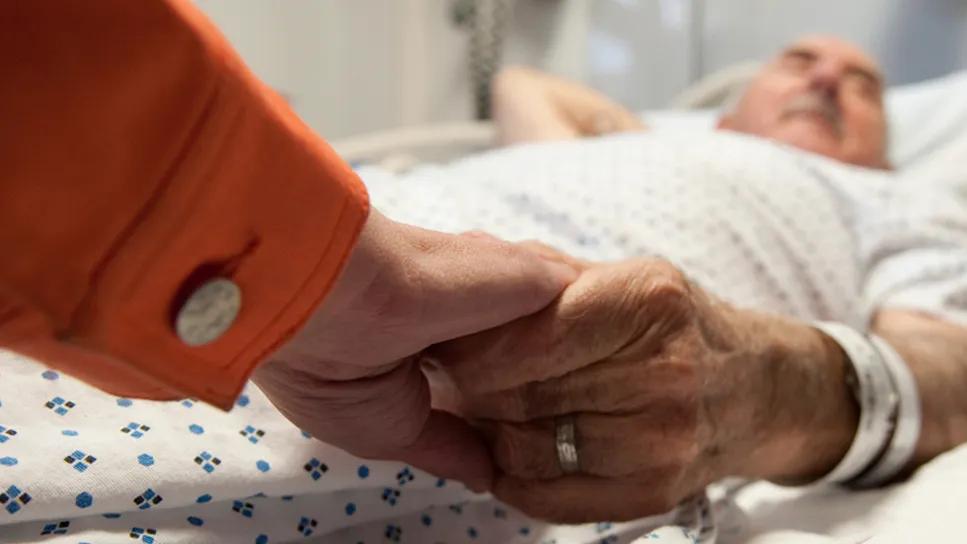Specialty clinic helps keep patients out of the hospital

When Susan Vicars, RN, worked in critical care years ago at Hillcrest Hospital, she and her colleagues grew to know certain patients all too well. Unable to successfully manage their chronic conditions, those people regularly became sick enough to require hospitalization.
Advertisement
Cleveland Clinic is a non-profit academic medical center. Advertising on our site helps support our mission. We do not endorse non-Cleveland Clinic products or services. Policy
One day, it dawned on Vicars that a particular patient was showing up much less frequently. Vicars learned that the woman had started seeing a provider for medication adjustments and, in the process, receiving other help she needed to stay on top of her health. The disease wasn’t uncontrollable, Vicars knew – the patient had just needed more help to control it.
Today, Vicars works fulltime providing exactly that kind of help to others as part of the Chronic Care Clinic at Cleveland Clinic Hillcrest Hospital. Formerly dedicated to helping heart patients manage anticoagulant regimens, the clinic now is prevailingly a nurse-run operation that cares for patients with congestive heart failure and a range of other conditions: renal disease, osteoporosis, hypertension, and chronic obstructive pulmonary disease (COPD). It also treats those being vaccinated for rabies and participating in smoking cessation programs.
“When I started working in critical care, I liked the patients and the thinking that was involved,” Vicars says. “Chronic care is sort of like that. I love these people.”
In addition to Hillcrest, the hospital system’s has five other clinics dedicated to chronic care in Northeast Ohio: at Fairview Hospital, Euclid Hospital, Marymount Hospital, South Pointe Hospital, and at the Medical Outpatient Center in Lakewood. .Another is expected to open toward the end of 2021 in Lorain County.
About 90 percent of Chronic Care Clinic patients end up there after having been hospitalized, says Brian Rink, MSN, MBA, RN, Director of Ambulatory Nursing at Cleveland Clinic. In many cases, their doctors have identified multiple lifestyle changes they need to make in order to stay well.
Advertisement
“It’s completely overwhelming for some people,” Rink says.
The clinics’ nurses and nurse practitioners, working closely with the patients’ specialists, break the directives down into achievable goals. “With most patients, we want to get them into a groove where they are self-managing,” Rink says.
Patients with chronic illnesses may have to get multiple factors right in order to maintain their health, Vicars says. Anticoagulants, in particular, require close monitoring to balance risks for clotting and bleeding. “There’s a lot to manage on a day-to-day basis when we’re dealing with these illnesses,” she says.
Titrating medications, or changing them if they stop working, is at the top of the list, but Vicars says she also helps patients understand new factors and symptoms.
“If a patient comes in concerned that they’ve gained seven pounds overnight, is there something going on or was is it the salt in that bologna and cheese sandwich they ate yesterday? Sometimes it’s about helping somebody figure out what tripped them up.”
Addressing fluid buildup, a frequent problem among patients with chronic heart failure and kidney disease, is one of the most common treatments, Vicars adds. It’s key to mitigate fluid buildup in the lungs, which can severely hinder breathing.
In addition to medication adjustments, the nurses also work hard to help patients manage dietary restrictions on a day-to-day basis, Vicars says.
Gary Kish, RN, who manages the clinics at Hillcrest, Euclid, Southpointe and Marymount, says that patients who rely on the clinics for help stay healthier. “We’re here to keep patients out of the hospital,” he says.
Advertisement
Rink says the goal for 2021 was to keep hospital readmissions among clinic patients to no more than 12%; currently, the readmission rate is 10% on the year. “When patients in this population cancel a visit, they are 30% more likely to be in the hospital,” Rink adds. “So we have a strong focus on outreach to patients who cancel, and to get patients in the same day who are having symptoms of exacerbation.”
Additionally, he adds, patients would benefit by being referred earlier in their disease state. “We think we can improve the overall quality of life for those who have chronic diseases,” he says.
On a busy day at the Hillcrest clinic, the staff of two nurse practitioners, two RNs and LPNs will see about 60 patients. Some may receive iron infusions or injections for anemia, while others need help managing adjustments to their anticoagulants. Caregivers will help them better understand their condition or disease, their individualized plan of care, and educate them about when they need to seek help from a doctor or the clinic.
Over time, trust builds. “I’ve cared for some of these patients for 15 years,” Vicars says.
Relationship building is an essential part of what Vicars does — a factor worth considering for nurses who think they may be interested in chronic care.
Advertisement
Advertisement

Planning continues with critical, patient-focused input from nursing teams

Strengthening care through targeted resources and frontline voices

Embracing generational differences to create strong nursing teams

CRNA careers offer challenge and reward

An unexpected health scare provides a potent reminder of what patients need most from their caregivers

Cleveland Clinic Abu Dhabi initiative reduces ICU admissions and strengthens caregiver collaboration

Veteran nurse blends compassion, cutting-edge transplant training and military tradition to elevate patient care

Embrace coaching and other tips to be a stronger leader